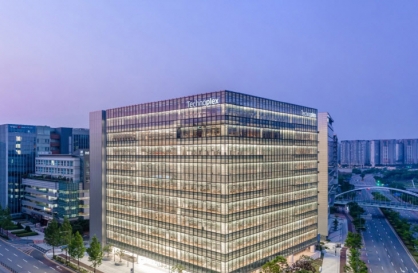Gwangju Biennale to focus on ‘Asian identity’ and raising social, political voice
By Lee Woo-youngPublished : July 10, 2012 - 19:31
Gwangju Biennale announced a full roster of artists, directors and the theme for this year’s edition that will help establish itself as a highlight event for contemporary art in Asia.
Asian artists account for almost half of the total 92 participating artists, whose countries of origin range from Qatar, Kuwait, Indonesia, Thailand, Taiwan, Japan and China to Korea.
“We selected 44 Asian artists and six female Asian directors in order to solidify the image of the event as the representative cultural event for contemporary art in Asia,” said Lee Yong-woo, president of Gwangju Biennale, at a press conference on Monday.
Korean artists Suh Do-ho, Lee Jeong-lok, Japanese artist Aki Sasamoto, Hiromi Tango, Chinese artist Han Dong and Lebanese-French artist Fouad Elkoury are some of the familiar names at this year’s Gwangju Biennale, now in its ninth edition.
Asian artists account for almost half of the total 92 participating artists, whose countries of origin range from Qatar, Kuwait, Indonesia, Thailand, Taiwan, Japan and China to Korea.
“We selected 44 Asian artists and six female Asian directors in order to solidify the image of the event as the representative cultural event for contemporary art in Asia,” said Lee Yong-woo, president of Gwangju Biennale, at a press conference on Monday.
Korean artists Suh Do-ho, Lee Jeong-lok, Japanese artist Aki Sasamoto, Hiromi Tango, Chinese artist Han Dong and Lebanese-French artist Fouad Elkoury are some of the familiar names at this year’s Gwangju Biennale, now in its ninth edition.

This year’s event, scheduled from Sept. 7-Nov. 11, sees the appointment of multiple directors for the first time, with Nancy Adajania, Wassan Al-Khudhairi, Mami Kataoka, Kim Sun-jung, Carol Yinghua Lu and Alia Swastika sharing the responsibility.
This year’s biennale also aims to shed light on social and political issues through the artists’ works, reflecting the original impetus for the founding of the biennale. The biennale was founded in 1995 in memory of the 1980 pro-democracy uprising in Gwangju.
“We also considered raising a social and political voice ― the kind of voice that only a biennale is privileged to have. We will deviate from the usual routine where viewers are overwhelmed by aesthetic beauty and discuss social and political matters,” said Lee.
Under the theme “Round Table,” the biennale aims to serve as a platform for restoring respect for other cultures and facilitate frank discussions about recent major social and political issues such as “Occupy Wall Street” and the “Arab Spring.”
This year’s biennale will consist of exhibitions and projects under six sub-themes: Logging In and Out of Collectivity; Re-visiting History; Transient Encounters; Intimacy, Autonomy and Anonymity; Back to the Individual Experience; and Impact of Mobility on Space and Time.
It will include 43 new projects and 15 residencies as well as 11 performances in addition to discussions and publication of e-journals.
Chinese artist Ai Weiwei and Korean artist Suh Do-ho, who are each transforming neglected rooms and buildings of the city into artistic, yet efficient places, will both introduce special projects.
By Lee Woo-young (wylee@heraldcorp.com)







![[Weekender] Korean psyche untangled: Musok](http://res.heraldm.com/phpwas/restmb_idxmake.php?idx=644&simg=/content/image/2024/05/02/20240502050841_0.jpg&u=)



![[Herald Interview] ‘Time to Be Strong’ follows retired K-pop idols’ self-discovery](http://res.heraldm.com/phpwas/restmb_idxmake.php?idx=644&simg=/content/image/2024/05/03/20240503050550_0.jpg&u=)





![[Eye Interview] 'If you live to 100, you might as well be happy,' says 88-year-old bestselling essayist](http://res.heraldm.com/phpwas/restmb_idxmake.php?idx=652&simg=/content/image/2024/05/03/20240503050674_0.jpg&u=)
